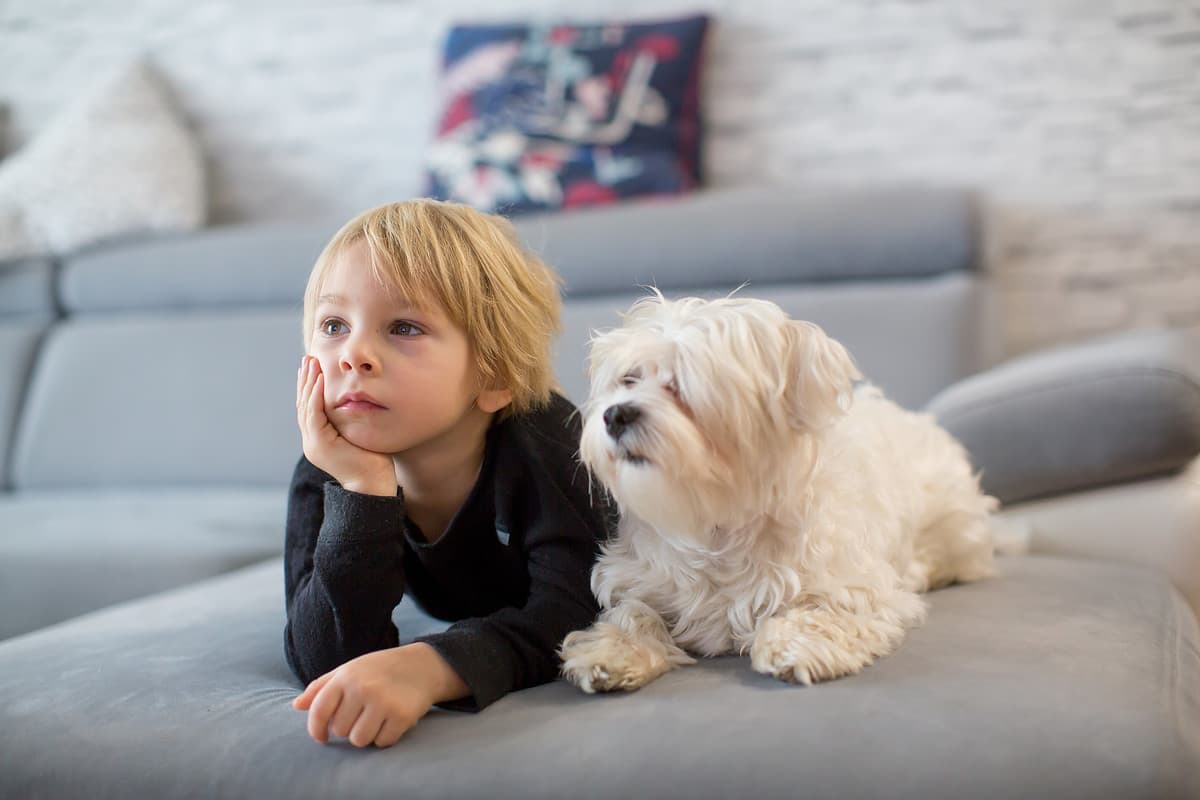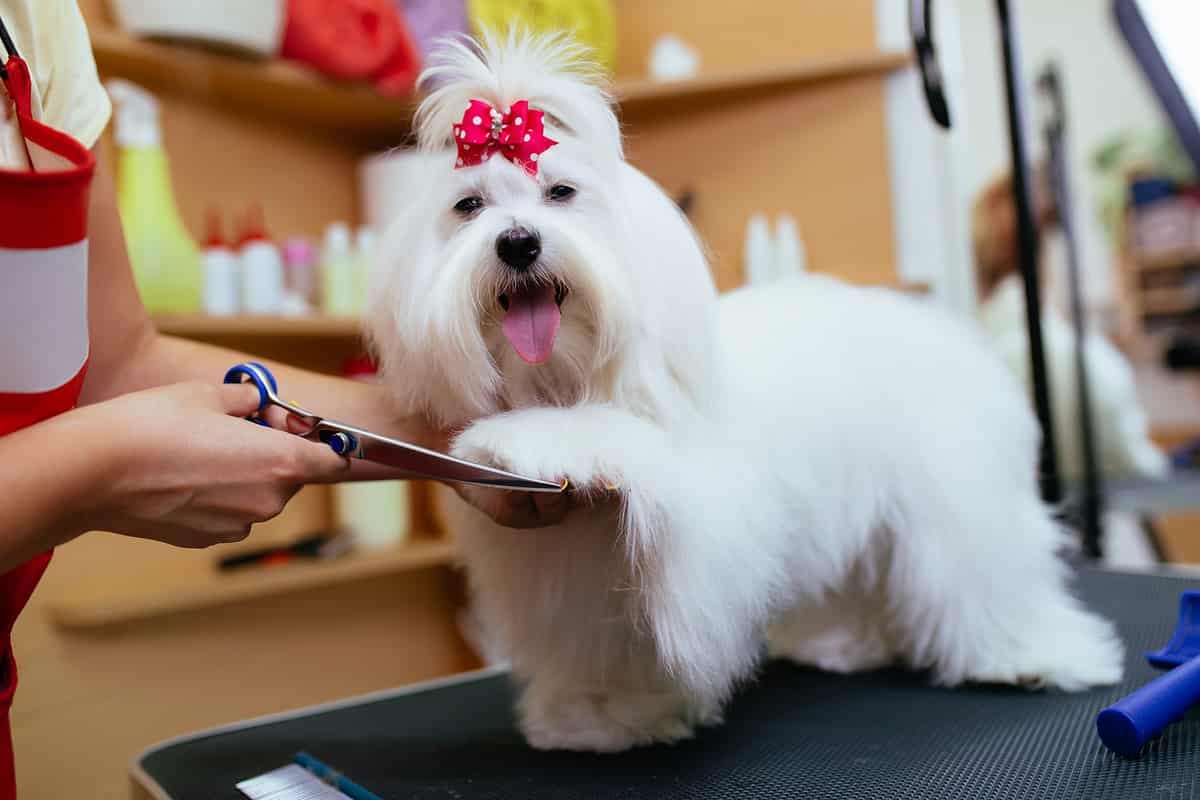When you think about getting a dog that fits well with your family, one of the most important things you'll want to consider is if it'll be good with your kids. You want a breed of dog that's friendly, loyal, and most importantly, safe to be around.
A Maltese is known for its small “toy” size, big eyes, and energetic personality. But is it safe for kids? And how do you know it'll be a good addition to your family? In general, yes, a Maltese's lovable personality is good with kids! Here's everything you need to know about this cute and loyal breed.
Maltese Temperament and Personality
While Maltese may be small in size, they tend to be a little tougher than they look. According to the American Kennel Club, these dogs grow to be between 7 and 9 inches tall and typically weigh around 7 pounds. Their average lifespan is 12-15 years. If you're considering adding one to your family, here are a few facts to keep in mind.
History of the Maltese
It's believed that the Maltese breed originated from the small island of Malta, which is located just south of Sicily, Italy. These dogs are known for being regal as they've been spotted as pets to royalty like Queen Elizabeth I and Mary Queen of Scots. Maltese were also bred for companionship and were often seen on the laps of famous women throughout history. Today, they are family pets and remain popular in dog show competitions.
Physical Traits
As mentioned, Maltese are very small in size. They're part of the “bichon” family and are known for being a lap dog. Maltese are known for their floppy ears, big eyes, and cute, button nose. They are also considered to be hypoallergenic, making them a perfect breed for people with allergies.
Some may choose to keep the Maltese's signature white fur very long and straight, while others may have them groomed more often. In fact, their coat requires regular brushing and grooming to keep them from becoming matted. You may see this dog with a bow in its hair to keep the fur from its eyes as well.
Personality
While a dog's personality is largely shaped by their upbringing and life experiences, this breed has several positive character traits. Maltese are generally gentle, loving, friendly, affectionate, fun, and playful. They are also known to be people pleasers and will often want to be right next to or close to their owner. Crate training your Maltese can help them with separation anxiety.
All of these characteristics are what make Maltese great with kids! However, they can also be difficult to house-train and finicky eaters. Additionally, they have a loud and sharp bark. Because they're so loyal to their owners, they tend to be very alert to unfamiliar sounds or people.

©Unsure/ via Getty Images
Care for a Maltese
As with all dogs, Maltese need regular care like nail trimming and annual checkups at the veterinarian. Beyond that, however, Maltese may also require special dental care, nutrition, exercise, and grooming. This breed also has common health issues to watch for.
Dental Care
Due to the Maltese's small and weak teeth, they can be prone to dental issues. Regular teeth brushing and a yearly dental cleaning at the vet can help to promote healthy teeth and gums. When brushing your dog's teeth, make sure to never use human toothpaste and instead look for dog-friendly toothpaste. Your veterinarian may have a brand that he or she recommends as well.
Additionally, chew toys can help to strengthen Maltese's teeth. They can also help to keep Maltese from chewing on things they shouldn't like shoes or other items in your home. Some treats also work as dental care so be sure to ask your veterinarian for recommendations.
Nutrition
It's very important to not overfeed Maltese as this can lead to obesity. These dogs are already small in size so obesity can cause other health and joint issues. To keep from overfeeding your dog, make sure to measure food portions. Also, be sure to never go overboard on treats. Moderation is key to a healthy life for this breed.
It's important to note that Maltese can be picky eaters, as well. You may have to try a few different food brands or types before you find one that your dog loves. It's also okay for these dogs to eat a few healthy human food options. But keep in mind that there are several foods they can NOT eat. If you're curious about what your dog can and can't have, the ASPCA has a list of 16 foods to never give your dog that you can use as a resource.
Exercise
Since Maltese are small, they don't require as much exercise as a larger breed might. 20 to 30 minutes of movement is usually enough. If you have an active family or kiddos that love to play fetch, your Maltese will probably get enough exercise without having to do anything extra! Otherwise, you can take them on a small walk or play with them indoors if it's too cold to go outside.
Grooming
As we've previously discussed, Maltese require regular grooming. Some prefer to keep their fur naturally long and straight. Others may want to have their fur trimmed and groomed regularly. Without regular grooming, their coats will likely get matted as these dogs do not shed much.
When it comes to grooming your Maltese, consider taking them to a professional groomer every few months. You can also regularly brush their fur at home and give them a bath every couple of weeks to keep them clean and healthy in between grooming appointments. You will want to trim the hair in their ears and keep their eyes clean as well, as this breed is prone to tear staining on their white fur.

©Group4 Studio/ via Getty Images
Lifespan
In general, Maltese are fairly healthy dogs and don't have nearly as many health issues as other breeds. Because of this, Maltese can live up to 15 years. Keep in mind that proper nutrition, exercise, and regular checkups at the vet can help this strong and resilient breed live a long and healthy life.
How to Create a Successful Relationship Between a Maltese and Your Family
In general, the Maltese breed is friendly, loving, and great with kids! However, they do require some training and need time to adjust to your children's personalities. While Maltese is not an aggressive or angry breed, overly rambunctious kiddos can sometimes cause them to nip or snap. Additionally, they can become jealous of new additions to the family.
The easiest way to create a successful relationship between a Maltese and your family is to set some ground rules with your kids and your dog. Here are a few ways to make sure your kids and your Maltese have a fun and loving relationship:
- Make sure your kids understand a few rules about life with a dog. Explain house rules like how they should not feed the dog from their plate or take the dog's food away.
- Explain to your children how this smaller-sized breed needs to be played with. Gentleness is important with toy breeds.
- Crate train your Maltese so that it has a safe place to go when it feels overstimulated or needs a break.
- Train your Maltese to not jump on people. This will keep it from jumping onto your children as well.
- Socialize your dog early and often so that it gets used to everyone in the family at a young age.
Is a Maltese Right for Your Family?
Maltese are a wonderful addition to many families! Their loving, caring, and loyal demeanor make them cuddlers and the perfect lap dog. However, it's important to remember that you'll need patience as you welcome your new pet to the family. And, as with any new pet, you'll need to work on training and carefully monitoring your new addition before you leave it alone with your kids.
Up Next
- Dog Age Chart to See How Old Your Pup Really Is
- Are Shih Tzus Good With Kids? What Parents Need to Know
- Are Poodles Good With Kids?
- 13 Small Dogs That Are Good With Kids
The image featured at the top of this post is ©Tanya Dol/Shutterstock.com.
